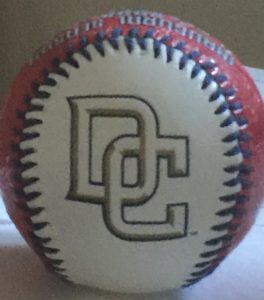August 16
1909 – The A’s storm Walter Johnson for 6 runs in 5 innings of a 6-1 Nats loss. Johnson accounts for the Nats lone run with his first big league homer. Johnson’s blast, only the 3rd homer that clears the Washington LF fence, goes through a window of an adjacent building.
1912 – With Rube Marquard holding the record for the longest winning streak by a pitcher(19), Johnson moves to within 5 games of Marquard’s record by winning his 14th straight. The Big Train two hits Chicago, 2-0.
1915 – The Nationals, seeking their first win in Fenway this year, are shutout by Joe Wood, 1-0. The Nats record at Boston falls to 0-11.
1933 – Joe Cronin‘s team is victorious for the 8th consecutive game, taking care of the White Sox at Comiskey, 5-1. With the second place Yankees losing again, Washington pushes their lead to 6.5 games.
1943 – A good news, bad news day for the Senators. The good news: The visiting Senators roll past Cleveland, 6-3, behind southpaw Bill “Lefty” Lefebvre. The Senators remain in 2nd place with the victory. The bad news: The Sens are 9.5 games behind New York, who are running away with the AL flag.
1957 – The Red Sox continue to be haunted by their former mate, Chuck Stobbs. Stobbs, 5-15 heading into tonight’s match at Griffith, blanks Boston on 5 hits, 5-0.
1963 – See if this refrain sounds familiar. A lifeless Nationals offense comes to life, but the pitching collapses for another loss. The pitching is great, but the offense is moribund for yet another defeat. Sounds like the 2008 edition of the Washington Nationals, but the 1963 version fit this mold as well, if not “better”, than the present team. While the 2008 Nationals have some talent, the 1963 team was trotting out the likes of Ken Retzer, Don Zimmer, Dick Phillips and Don Blasingame. As for the game on this date in 1963, Washington fans, needing another reminder of the original Senators, lose to Camilio Pasqual and the Twins in the Twin Cites, 7-5.
Senators Birthdays
Lewis Emmett Carpenter B Aug. 16, 1913 D Apr. 25, 1979
Senators Short Timer Lew Carpenter appeared in 4 games, pitching just over 3 innings with the 1943 team. He surrendered 1 hit, 4 walks, was charged with 1 wild pitch and 1 hit batter, striking out 1.
Noble Jan Dukes B Aug. 16, 1945 Still Living
Another Short Timer, Jan Dukes pitched in 13 games with the Senators in 1969 and 1970 and returned for 3 more games with the 1972 Texas Rangers. His career record: an 0-2 W/L record with a 2.70 ERA.
Joseph Hovlik (born Havlik) B Aug. 16, 1884 D Nov. 3, 1951
Joe Hovlik continues todays theme of Senators Short Timers by appearing in just 4 games during the 1909 and 1910 seasons with the Senators. He’d move to the Chicago White Sox for the 1911 campaign and pitch in 12 games, compiling a 2-0 record.
Frederick Donald Rudolph B Aug. 16, 1931 D Sep. 12, 1968
Baltimore native Don Rudolph got his major league start with the Chicago White Sox in 1957. Another sparingly used pitcher, Rudolph would only play in 16 games in a White Sox uniform between 1957 and 1959 before being traded to the Cincinnati Reds in early May of 1959.
After another 5 games with the Reds that season, Rudolph would not resurface in the majors until 1962 when he returned as a Cleveland Indian.
Rudolph would only pitch in 1 game for Cleveland before being traded to the Washington Senators, along with Steve Hamilton, in exchange for Willie Tasby. In Washington Rudolph would finally get some playing time, appearing in 37 games in both 1962 & 1963 and 28 games in 1964. Rudolph would post a record of 8-10 in 1962, 7-19 in 1963 and 1-3 in 1964, pitching for the early expansion Senators.
His major league career would end with the close of the 1964 season.
Eugene Richard Woodling B Aug. 16, 1922 D Jun. 2, 2001
Outfielder Gene Woodling played 17 seasons for 6 different major league teams, including 2 separate stints with 2 of those teams, but suffered the cruel fate of ending his playing days with the 1961 Senators and the 1962 Mets.
Woodling’s first major league appearance came in 1943 with the Cleveland Indians. He wouldn’t return to the majors until 1946 when he’d again play for Cleveland in 61 games.
Traded to the Pittsburgh Pirates, Woodling would play in 22 games in 1947. At the end of the 1947 season, the Pirates sent Woodling to the San Francisco Seals of the Pacific Coast League, where he’d play in 1948.
Starting in 1949, Woodling would spend 6 seasons on the roster of the New York Yankees, hitting over .300 in 1952 & 1953 and would play in the World Series every year from 1949 through 1953 as the Yankees won an unprecedented 5 straight World Series. He’d hit a collective .318 in World Series play, including 5 doubles, 2 triples and 3 home runs in 85 AB.
Traded to the Baltimore Orioles after the 1954 season, Woodling would only play in 47 games as an Oriole in 1955 before he’d be traded once again, this time for a second stint in Cleveland.
Woodling would remain with the Tribe through mid-June of 1958 when he’d be traded back to Baltimore where he’d remain through the end of 1960. During his second stop in Baltimore, Woodling would be selected to the 1959 All Star Team.
Selected by the “new” Senators in the expansion draft, Woodling would spend 1961 in Washington, playing in 110 games and hitting .313 with 10 home runs. Returning with the Senators in 1962, he’d play in 44 games before being purchased by the New York Mets in mid-June.
Woodling would play in 81 games for the Mets in 1962, but would be given his release prior to the start of the 1963 season, marking the end of his major league journey.






